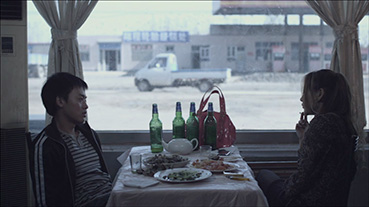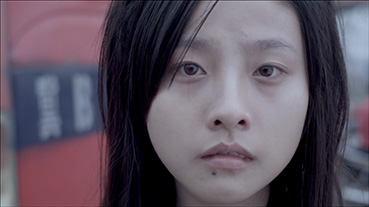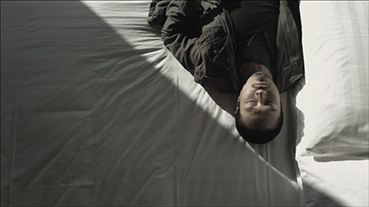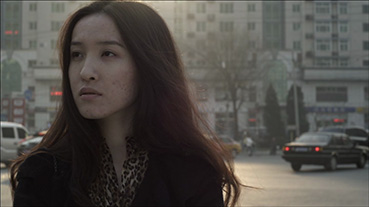|
If you're the sort of person who jumps on-line to describe any non-English language film that disregards the standard approach to storytelling as "the worst film I've ever seen," it's probably best for us all if you give Chinese director Mao Mao's Here, Then [Ci Chu Yu Bi Chu] a miss. I'd go as far as to suggest that even a few of those who are sympathetic to unconventional cinema might struggle a bit here.
Allow me to elaborate. For his debut feature, Mao has consciously opted to break with the conventions of narrative cinema and capture the essence of an emotional disconnection that he clearly feels is infecting elements of modern Chinese society. There are thus no traditional character or narrative arcs, no character back-stories and little in the way of expository dialogue. Many sequences are covered in single, static and sometimes unconventionally framed shots and rarely follow immediately on from the scenes that precede them. Oh, and cinematographer Liu Aiguo has photographed much of the film with the iris wide open, resulting in sometimes microscopically shallow depth of field and shots in which the subjects move in and out of focus and some of the action is deliberately indistinct. Still up for it? Good, because the rewards of this singular approach are definitely there, but require of the viewer both patience and an open mind about what can constitute feature length cinema.

What Mao offers us are small fragments from the lives of China's listless and emotionally alienated youth, with actions and exchanges observed largely in isolation, shorn of introductions and any real resolution. With no names supplied and dialogue kept to a minimum, it takes a while to work out how the characters are connected. As one girl – identified as Yangyang in the end credits – works the land, is the boy (named Xiao Bin) who hovers unhelpfully in the background her brother, friend or lover? What does she mean when she asks him over a meal, "Are you leaving this time?" Just who is the seemingly indifferent Lily to Xiao Bin? Is the source of the sizeable wad of cash she is counting in what looks like hotel bed what we have been quietly steered to suspect? A degree of clarity is provided by later fragments while others appear to subtly misdirect us – at one point two girls stand distractedly while a male duo of similar age converse in the background, a shot in which the framing, body language and our unfamiliarity with the characters initially misled me into believing that a deal involving prostitution or drugs was being conducted.
Stylistically, Mao appears to be experimenting with technique, varying his approach on a scene-by-scene basis, with locked down angles alternating with slow, smooth tracks and handheld walking shots. In one of the more revealing early sequences, the camera pulls back from a blurred image of activity being viewed through a window (the pane itself being the point of narrow focus rather than what lies beyond) to reveal Xiao Bin in a café with Lily, their initial silence and the manner in which they regard each other telling us as much about their relationship as the brief conversation that follows. By the time Lily leaves, the camera has has returned to its original position, which renders the car that she departs in as an impressionistic blur. There's also a documentary element to many scenes, notably during a beach trip in which this seemingly despondent group spark briefly into life, as they frolic in shallow water and build sand breasts and genitalia on the sleeping Xiao Bin's body.

Then, almost exactly halfway into the film, there's a single-shot sequence that shatters this sense of observational realism and punches a hole in the fourth wall. As Yangyang and a female companion stand waiting for the bus home, techno music drifts onto the soundtrack (we can presume from a car radio) and the girls begin bobbing to it like clubbers on the fringe of a nightclub dance floor. As the camera slowly moves towards Yangyang, her movements decelerate and she stares directly into the lens, the soundtrack gradually swamped by an unsettling blend of urban and electronic clutter. As the camera closes in on her face, there is almost a sense that a portal has opened from her world into ours, a collapse of the traditional barrier that has enabled a film character to becomes momentarily aware of the audience's presence, her expression a blend of confusion and concern at this temporal disruption (on my second viewing it occurred to me that she might even have been granted a vision of her own future – you'll need to see the film to understand why this is pertinent). Then in a blink it is gone. Yangyang snaps back to reality, the camera recedes and the girls boards their bus as if this moment had never occurred. It's an extraordinary sequence, one that left me open mouthed for reasons I find impossible to precisely define. As the signpost of a midway switch of focus, it's as strangely thrilling as the one in Lost Highway, marking as it does the point when a new set of characters will take centre stage, their wider age range and locational shift suggesting that this new alienation is not confined to the young or to rural districts.
The key question, of course, is whether this fragmented approach actually works. Well, yes and no, but for the most part I'd suggest it does, a viewpoint that a second viewing really does help to cement. The prime casualty, unsurprisingly, is character engagement, of which there is precious little, and there's a valid argument for suggesting that Mao is attempting to cinematically recreate his characters' sense of emotional and societal dislocation by asking us to experience it with them. There's certainly little doubt that the film is likely to irritate a portion of its potential audience, though frankly this is par for the non-conformist cinema course.

Yet I'll freely admit that, in spite of some initial disorientation, I quickly found myself strangely hooked by Mao's approach. How much of this was initially down to expectations for later narrative complexity that I eventually realised would be unforthcoming is hard to say, but the very real pleasure that comes being tasked to construct even a half-formed picture from initially indistinct jigsaw pieces did prove an increasingly involving draw. The fragments themselves also prove intermittently fascinating and often suggestive: the young photographer who lays back on a hotel bed (the reason for him being in this particular room is a small story in itself) and seems to be absorbed by it as the light level fades; the sideways tracking shot in which Lily is being shadowed by bike-riding Xiao Bin, a camera move whose speed does not always match that of its subjects and allows the sequence a small surprise ending; the remnants of an unfinished beach construction that provide a chance link between characters who have never met; the pop song that weaves a small thread through both narratives; the mobile phone that functions as a bridge between characters from the first and second half; the final, possibly metaphoric meditation on an approaching offshore storm. There's also a strong suggestion that the characters in both halves are driven more by base desires than a search for emotional fulfilment; here sexual activity is confined to infidelity, rape, or engaged in as necessary aspect of the pursuit of monetary gain. We're left with no answers and no real sense of conclusion, but the cumulative effect is, for this viewer at least, still hauntingly effective and strangely satisfying.
Here, Then, in common with an increasing number of low and even medium budget films, appears to have been shot on HD (the sometimes narrow depth of field made me wonder if Liu Aiguo's camera of choice was a high end DSLR), and is thus presented here in the correct aspect ratio of 1.78:1, which is anamorphically enhanced. Detail is good when required to be (the use of blurred imagery is a deliberate aesthetic choice), as is, I presume, the toned down colour scheme, something particularly evident in the greenish hue of bulb-lit interiors. There is some occasional banding on areas of single colour, including the sky of the final image, which is likely a side-effect of shooting on digital in low light.

The Dolby 2.0 stereo soundtrack is a largely and appropriately subtle affair that briefly leaps into more ear-catching life for the audio assault in the above-mentioned look-to-camera sequence.
The only on-disc extra is a short but interesting Interview with Director Mao Mao (11:03), who talks about how the film came to be, the changes it underwent from script to screen (it was originally written as a more conventionally structured drama), the social and political aspects that end up being part of any such film, and the audience and critical reaction to it ("not bad," he remarks unfussily, "we won a few awards"). Towards the end he is asked a couple of longer and more probing questions by documentary filmmaker Zhao Liang, who states that while he initially liked the film, he later had second thoughts, and tells Mao bluntly, "If I were not your friend, I might not have waited to watch the film to the end."
Sitting inside the DVD case is a Booklet featuring an enthusiastic appreciation of the film by cinema journalist Harriet Warman. It's interesting that we both picked the sequence in which Yangyang stares into the camera as a favourite, but came to very different conclusions about its meaning.
For a first film, Here, Then is a bold but risky experiment that a fair few will doubtless dismiss as a misfire. I can see where they're coming from, but despite lacking many of the traditional hooks and components of narrative cinema, it still managed to grip me from the opening frames, and despite a lack of resolution did not leave me feeling cheated. Feel free to disagree. Although not an easy sell even to devotees of new Chinese cinema, it's exactly the sort of film that specialist distributors like Second Run should be picking up for UK release, and as ever they have done well by the film, with a solid transfer, an interesting interview and written essay.
|